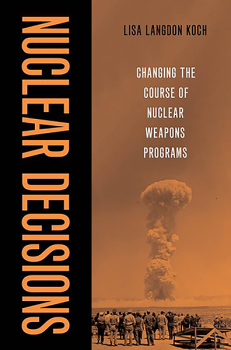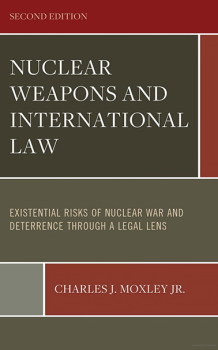“For 50 years, the Arms Control Association has educated citizens around the world to help create broad support for U.S.-led arms control and nonproliferation achievements.”
July/August 2024 Books of Note
July/August 2024
Nuclear Decisions: Changing the Course of Nuclear Weapons Programs

By Lisa Langdon Koch
Oxford University Press
2023
In Nuclear Decisions, Lisa Langdon Koch centers a fact that is widely known but seldom emphasized in theorizing about nuclear proliferation: the pathway from initial choices about nuclear weapons to successful deployment can be halting and full of secondary decision-points. Koch’s work attempts to explain this meandering by focusing the reader’s attention on the internal organizational factors that can accelerate or reverse nuclear programs, highlighting the autonomy of nuclear agencies and the degree of military involvement in decision-making. Although the author gives equal credit to changes in the permissiveness of external nonproliferation regimes, her case studies are most valuable in tracing the interplay of bureaucratic and individual preferences as they are mediated by the political structure of each proliferating state. Koch provides periodic examples of how her theoretical approach produces a more satisfactory explanation for proliferation patterns than security-focused accounts. The choice of including lesser-known cases of states that have eschewed nuclear weapons programs, such as Sweden and South Korea, makes this book easily recommendable as an introduction to historical proliferation cases, even to a reader uninterested in the theoretical goals of the project.—XIAODON LIANG
 Nuclear Weapons and International Law: Existential Risks of Nuclear War and Deterrence Through a Legal Lens
Nuclear Weapons and International Law: Existential Risks of Nuclear War and Deterrence Through a Legal Lens
By Charles J. Moxley
Hamilton Books
2024
Charles J. Moxley pulls no punches in the revised second edition of his book Nuclear Weapons and International Law. He makes the legal case that “the threat and use of nuclear weapons, including low-yield nuclear weapons, are unlawful in all or virtually all circumstances in which the United States might consider using such weapons.” His book has three forewords, including one by former U.S. Defense Secretary William Perry, highlighting the importance that other experts assign to the text. The book looks at how nuclear weapons intersect with the law, public health, human rights, and U.S. policy. He analyzes nuclear deterrence; legal probabilities relating to the potential use of nuclear weapons, recklessness, and foreseeability; and principles and laws applied throughout history. Moxley also explores the risk factors of a nuclear weapons regime, addressing not only the weapons themselves but also delivery vehicles, radiation effects, risks to human life, nuclear winter risks, and the fostering of an arms race. Moxley ends on a powerful note, stating that nuclear-weapon states are “substantially failing” their Article VI commitments under the nuclear Nonproliferation Treaty by not negotiating disarmament agreements in good faith.—LIBBY FLATOFF
